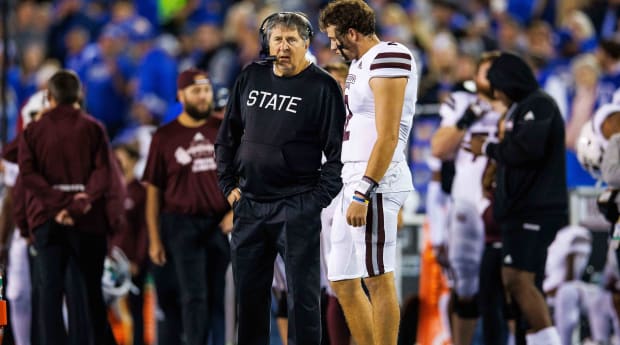You may know Mike Leach’s eclectic off-the-field personalities and interests. From the pirates, to the wedding advice, to the candy opinions. As onlookers, we minored in his personality quirks, while those around him every day majored in them. And over the past week since Leach’s death, those who coached alongside him and played for him have filled the void with remembrances of the person they lost—the sharp edges of annoyance dull into fondness and one thinks of the moments they’d give anything to relive.
Luke Falk wants to take you back to the Washington State QB meeting room, like many former players would. What sticks with him more than the touchdowns or interceptions are the little behind-the-scenes moments. There are two people Falk wishes were still with him. One is “Papa Leach,” Falk’s nickname for the former Washington State, Texas Tech and Mississippi State head coach; the other is Tyler Hilinski, Falk’s former QB battery mate who died in 2018.
“He knew that I didn’t like when Leach would go on a tangent about the same story that we had heard over and over again and make us late for practice,” Falk says. “Leach was never on time to any meeting. And I always was like, ‘If you're on time, you’re 10 minutes late.’ And I always wanted to get to practice on time to do my Tom House warmup.
“Tyler would look over at me, give me a little wink, and then throw a breadcrumb out to [Leach]. Then, Leach took it a mile, and it was like another hour. And then we were 30 minutes late for practice. I remember how many times I was sprinting to get my pads on, just cursing under my breath.”
It is not a surprise that someone whose mind worked like Leach’s would view time as more of a loose suggestion than adhering to it with the utilitarian-type strictness of a regular football coach. Leach didn’t believe in stretching the typical way you’d expect a football team to do it—with rows grouped by position getting loose statically.

Jordan Prather/USA Today Network
If Falk succeeds in entering the collegiate coaching ranks, he would be yet another branch in the illustrious Leach coaching tree that includes (among others) head coaches Dave Aranda, Neal Brown, Sonny Dykes, Kliff Kingsbury, Josh Heupel, Dana Holgorsen, Lincoln Riley, Eric Morris and Seth Littrell, plus coordinators like USC’s Alex Grinch and offensive line coach Clay McGuire. That list alone could serve as proof of Leach’s on-field impact, which began when Leach and Hal Mumme met in the late 1980s at Iowa Wesleyan to form one of modern football’s most influential brain trusts.
In a 1984 Ford Taurus, the pair traveled everywhere they could to talk to anyone who was throwing the ball. Over the course of the first three years of their partnership, they sketched out plays on napkins and tablecloths to develop a system built around a passing strategy that wasn’t just an extension of the running game, but rather in place of it. This was how the Air Raid offense was born.
Mumme says they “stole the bones of it” from BYU—Leach was a student and played rugby there, while Mumme faced the Cougars while coaching at UTEP. In 1989, when Mumme got the head job at Iowa Wesleyan, he needed an offensive line coach. At the time, you’d be hard-pressed to find someone who believed in dropping back to throw the ball 50 times a game. Mumme needed a coach who believed in the system, and Leach did.
“In order to be a good teacher, you have to be able to command attention,” Mumme says. “You can talk all day long, but if the people in the room aren’t listening to you, then it’s just wasted air. And Mike had a way of, through various forms—most of it humorous, some of it curious—of appealing to people, especially young people.”
If schemes take on the personality of their coaches, the Air Raid is a reflection of how Leach’s mind worked. It gives the quarterback freedom in an already loose structure. Mumme calls the system more a philosophy than a playbook. Yes, the signal-caller must go through reads, but beyond that, the QB is tasked with finding open space or grabbing grass.
Great athletes often have a hard time when they transition into coaching, because they lack that teaching aspect. Why can’t an athlete simply do it the way they did? The great coaches motivate players to think like they do as much as possible. Leach gave his players the freedom to create down-to-down by promoting an ownership of the system during the offseason, an extension of his inquisitive nature and interest in entertaining unconventional ideas. Away from the rigors of in-season practices, Leach’s quarterbacks ran only a handful of schemes, keeping it simple but running those Air Raid concepts as much as they could.
“I used to watch film right down the hall from him,” Falk says. “I said, ‘Hey, I think on our smash concept, we really can run a corner post here.’ And he said, ‘Put it in the game plan.’ Then, on the sideline, I bumped him. I’m like, ‘Hey, it’s there, it’s there.’ And lo and behold we call it and we get a 90-yard touchdown. That was one of my most proud moments, and I thought it was pretty cool. How many coaches are going to listen to the kid that’s never played that just got put on scholarship?”
Leach kept the purest version of the Air Raid system, whereas many of his protégés either added more of a rushing attack or tweaked and adapted things. Riley layered a physical run-pass option system on top of the passing concepts. Holgorsen added more play-action passing and conventional run game. But Leach stayed true to the system he built with Mumme, with the only real innovations being the addition of more shotgun and hurry-up tempo over the years.
“As a young coach, hell, you think you know everything,” McGuire says. “I was asking Hal—me and Lincoln had all these ideas on how to run a shallow [route]—and we’re sitting there asking, ‘Well, why wouldn’t we do this? This is the greatest thing in the world, and we should do it,’ blah, blah, blah. I asked Hal that once, and he goes, ‘Clay, me and Mike, we were just like you guys once. We were young and we came up with all the same ideas you guys are coming up with and we were the ones that got to do all this s--- and figure out which ones worked and which ones didn’t.’”
At times, Leach and his offense could appear rigid to a fault. He won just one Apple Cup while at Washington State, with former Washington coach Jimmy Lake saying the Huskies did the same thing to defend the offense every year, because it didn’t really change. Leach’s insistence on constant reps of minimal concepts also meant it wasn’t plug-and-play from the moment he got on campus, and it took a few years for the system to take off as players, particularly receivers and quarterbacks, got more comfortable. And there is, of course, the misnomer about the inherent lack of physicality for an offense that doesn’t run the ball much (the running plays that do happen are often checks from the QB at the line of scrimmage).
“Just because we threw the ball, we weren’t going to be a soft team, and just because you run the ball every play doesn’t mean you’re a tough team,” McGuire says. “You saw that in his teams. When you watched those O-lines, they were tough physical lines. We had a lot of really tough, physical running backs that ran the ball hard. One thing that was always [a source] of pride was how hard those receivers blocked. They were incredible on the perimeter, because so much of what we do in that offense is perimeter-based.”
Leach had only four losing seasons over 22 seasons in Lubbock, Pullman and Starkville. Where he won is nearly as important as who he won with: a rotating door of QBs like walk-on Falk, not five-star, no-brainer talents at the controls of the incredibly proficient offense. His recruiting classes weren’t at the top of the rankings—they were bespoke players for a bespoke system. Players had to fit within it, and fit in with Leach.
What makes football unique at this level is you can tune in on any given Saturday and watch different types of lineups march to victory—a team with gobs of talent, another with multitudes of speed, or a service academy that runs the triple option. A Leach team, however, won with the Air Raid, no matter where he coached. College football needs football minds like Leach—they make the game interesting and bring contrasting styles of brilliance.
Leach was your favorite coach’s favorite coach, because he didn’t win at places accustomed to doing so. There will be a piece of Mike Leach on any given Friday, Saturday or Sunday every time you see a team run a mesh route in the Super Bowl or Y-cross play in a state championship game. His impact will endure because of his successes, and he did it his way until the very end. Even if it meant his quarterbacks were often late to practice.







